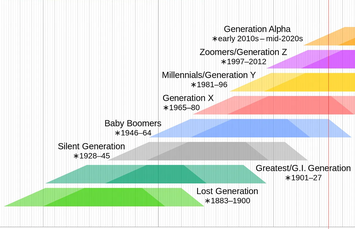
Generation Z gets a lot of bad press. We are constantly hearing about how smart phones have wrecked their psyches. We hear about how fragile they are, how much trauma they have, etc.
Despite the very real problems Generation Z faces, I’m actually bullish on this generation.
Every generation seems to get talked about negatively at first. “Kids these days” must be the oldest complaint in human civilization.
Nothing could be more normal than having having challenges in high school. Nobody has it all figured out in college. I saw a stat that said only 4% of employers thought Gen Z was the most culturally aligned with their business. But when have twentysomethings ever concerned themselves with being culturally aligned with a business?
I think there’s a very good chance that Gen Z grows up and matures into something far better than most people think possible.
I’m sure my experience is not representative, but when I meet Gen Z people these days, I’m very impressed. The folks I’ve met at American Moment are very impressive. My former colleague Alex Armlovich recently said, “I'm stunned by the quality of the intern applications we've been getting. Hard enough to narrow down interviews; picking between finalists is even worse.”
There’s a lot of great Gen Z talent out there. And the best of them have their act together in ways well beyond what my Gen X slacker generation did at their age.
A pastor who does college ministry recently shared some of his thoughts on Generation Z with me. While he acknowledged their problems, and was not ready to say that everything was alright with them, he had a number of positive things to say:
Here’s my hope with Gen Z: They know something is wrong with the world we’re living in. These kids have seen every institution fail them (schools during Covid, science during Covid, politics since 2016, journalism since 2016, the economy and current economic realities, Hollywood movie malaise and even music.) They know something is wrong, and they know all the answers provided for them by all the places that claim to have answers don’t work. I just found out a few weeks ago that my students love early 2000s music because they say “all our music is depressing.” Hence a lot of the 90s revival that’s been happening in fashion, movies, etc. FINNEAS’ song “The 90s” describes this really well.
He also notes that those who are Christian have a very different attitude than the previous generations in relating to this world:
This current group of students (mid to late Gen Z) gives me a lot of hope. They’re all kind of “based Christians” in Gen Z lingo. The Christians students are openly Christian, and don’t care what other people think about it. They want to reach their peers, study the scripture, and participate in worship - A LOT. In his Rebuilders Podcast (which I highly recommend) Mark Sayers thinks the Gen Z may actually be Gen Zeal. They even wear openly Christian clothing, which I NEVER would have done! It’s like I’m living out the “Awakening" idea in Howe’s 4th Turning framework. I’ve not really changed anything I’ve been doing in my ministry, but the fruit has come in and its falling off the trees.
This reminds me of the way Rod Dreher describes young Catholics in France.
As I’ve noted before, there’s a curious optimism in a segment of Gen Z. I think about someone like that Redeemed Zoomer character, who has a plan to revitalize mainline Protestant denominations.
His plans might be quixotic, but they are animated by positivity, energy, a can-do spirit, and optimism about the possibilities of the future that you would not see in prior generations.
Read the rest of this piece at Aaron Renn Substack.
Aaron M. Renn is an opinion-leading urban analyst, consultant, speaker and writer on a mission to help America's cities and people thrive and find real success in the 21st century. He focuses on urban, economic development and infrastructure policy in the greater American Midwest. He also regularly contributes to and is cited by national and global media outlets, and his work has appeared in many publications, including the The Guardian, The New York Times and The Washington Post.
Photo: Cmglee via Wikipedia under CC 4.0 License.












